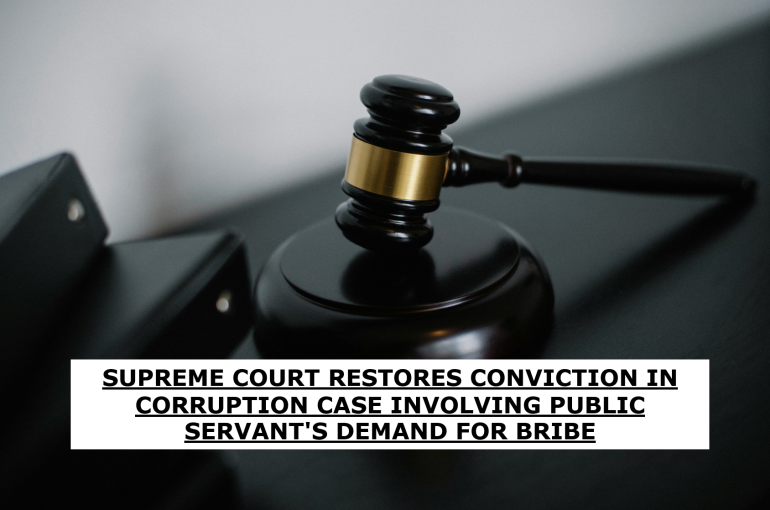SUPREME COURT RESTORES CONVICTION IN CORRUPTION CASE INVOLVING PUBLIC SERVANT’S DEMAND FOR BRIBE
Supreme Court Restores Conviction in Corruption Case Involving Public Servant’s Demand for Bribe
A three Judge Bench of the Hon’ble Supreme Court comprising of Chief Justice Sanjeev Khanna, Justice Sanjeev Kumar and Justice R. Mahadevan passed a judgement dated 26.11.2024 in the matter of State of Karnataka v. Chandrasha Criminal Appeal No.2646 of 2024 wherein the Hon’ble Bench held that in corruption cases, the Prosecution must prove the demand and acceptance of bribe in order to charge a public officer under the Prevention of Corruption Act, 1988.
Facts
The case involves allegations of corruption against the Respondent, a public servant working as a First Division Assistant in the Sub-Treasury Office, Afzalpur, Karnataka. The Complainant, an employee of a school, alleged that the Respondent demanded a bribe of ₹2,000 for processing a bill related to the encashment of surrender leave salary for him and three other staff members. On refusal to pay the bribe, the Complainant approached the Lokayukta Police, who laid a trap in order to catch the Respondent. The Respondent was caught accepting the bribe, and tainted currency notes were also recovered from his possession.
The Ld. Trial Court vide Order dated 13.10.2015 convicted the Respondent under Sections 7 (Offence relating to public servant being bribed) and 13(1)(d) read with Section 13(2) (Criminal misconduct by a public servant) of the Prevention of Corruption Act, 1988 (Act), sentencing him to imprisonment of 6 months and a fine of Rs. 2500/-.
In his defence, the Respondent contended that the amount that was recovered from him was repayment of a private loan and not a bribe. Moreover, there was no official work pending with the Complainant at the time when the trap was laid down by the police.
The High Court of Karnataka in Criminal Appeal No. 200105 of 2015 overturned the conviction vide judgement dated 16.02.2022, citing a lack of evidence for pending official work between the Respondent and the Complainant and also due to procedural irregularities while proceeding against a public officer, leading to the acquittal of the Respondent.
The Hon’ble High Court’s judgement led to the filing of the present Criminal Appeal by the Prosecution.
Issues
- Whether the demand and acceptance of bribe by the Respondent were established beyond reasonable doubt.
- Whether the Prosecution adhered to the legal requirements, including obtaining sanction for Prosecution under the Prevention of Corruption Act.
- Whether the High Court erred in acquitting the Respondent by dismissing the Prosecution’s evidence
Decision by the Supreme Court
The Hon’ble Supreme Court took consideration of the relevant testimonies of the witnesses and the Complainant ‘s testimony was corroborated by other witnesses (P.W.2, P.W.3), recordings, and documentary evidence. The Hon’ble Bench held that the essential elements of demand and acceptance were proven beyond reasonable doubt as rightly stated by the Ld. Trial Court.
Subsequently the Hon’ble Apex Court also held that the Police were able to recover the marked currency notes from the Respondent’s possession which were later corroborated with the Prosecution’s case. It was also found out that the Hon’ble High Court erred in reaching the conclusion that no work was pending with the Respondent, ignoring that the cheque related to the bill was not issued until after the trap was laid.
Moreover, the Respondent in its defence contended that prior sanction must be obtained before proceeding against public officers under Section 19 of the Act (Previous sanction necessary for Prosecution). The Apex Court held that all the necessary sanctions were duly taken by the Prosecution. Hence, there was no procedural irregularity in grant of sanction against the Respondent.
The Hon’ble Court also held that the Respondent had failed to substantiate the claim of private loan provided to the Complainant or rebut the presumption of corruption under Section 20 the Act (Presumption where public servant accepts any undue advantage).
Therefore, the Apex Court reversed the judgement passed by the High Court and held that the High Court erred in acquitting the Respondent even when substantial evidence was present against the Respondent.
The Supreme Court concluded that the Hon’ble High Court’s acquittal was unsustainable and hence, reinstated the Respondent’s conviction and sentence as determined by the Ld. Trial Court. The Respondent was directed to serve the remaining sentence, and the imposed fine was upheld.
ARJAV JAIN
ASSOCIATE
THE INDIAN LAWYER & ALLIED SERVICES
Editor’s Comments
The Judgment reinforces the Judiciary’s stance against corruption and the importance of holding public officials accountable. The Hon’ble Supreme Court reiterated that in corruption cases, the Prosecution must prove demand and acceptance of bribe, which were sufficiently established here through direct and circumstantial evidence. Hence, the presumption under Section 20 shifts the burden to the Accused to disprove the allegations.
SUSHILA RAM
ADVOCATE AND CHIEF CONSULTANT





































Leave a Reply